-
 Bitcoin
Bitcoin $84,258.9872
0.35% -
 Ethereum
Ethereum $1,590.5943
1.14% -
 Tether USDt
Tether USDt $0.9998
-0.02% -
 XRP
XRP $2.0990
1.26% -
 BNB
BNB $587.2456
1.30% -
 Solana
Solana $132.5296
6.11% -
 USDC
USDC $0.9999
0.00% -
 TRON
TRON $0.2483
-2.37% -
 Dogecoin
Dogecoin $0.1557
1.96% -
 Cardano
Cardano $0.6199
2.68% -
 UNUS SED LEO
UNUS SED LEO $9.1185
-2.93% -
 Chainlink
Chainlink $12.4572
2.80% -
 Avalanche
Avalanche $19.2046
1.97% -
 Toncoin
Toncoin $2.9568
3.52% -
 Stellar
Stellar $0.2397
2.14% -
 Shiba Inu
Shiba Inu $0.0...01181
1.81% -
 Sui
Sui $2.0961
0.90% -
 Hedera
Hedera $0.1602
2.15% -
 Bitcoin Cash
Bitcoin Cash $330.4313
4.06% -
 Polkadot
Polkadot $3.6278
3.32% -
 Litecoin
Litecoin $74.9638
1.65% -
 Hyperliquid
Hyperliquid $16.4916
8.27% -
 Dai
Dai $0.9999
-0.01% -
 Bitget Token
Bitget Token $4.3499
0.87% -
 Ethena USDe
Ethena USDe $0.9990
-0.03% -
 Pi
Pi $0.6068
-1.04% -
 Monero
Monero $216.4766
0.12% -
 Uniswap
Uniswap $5.1795
0.94% -
 Pepe
Pepe $0.0...07203
1.55% -
 OKB
OKB $50.4898
-2.39%
Why do NFTs require cryptocurrency to buy?
NFTs require cryptocurrency due to blockchain's decentralized nature, enabling secure, fast transactions and aligning with the ethos of financial sovereignty.
Apr 08, 2025 at 12:07 pm

NFTs, or Non-Fungible Tokens, have become a significant part of the cryptocurrency ecosystem, primarily due to their unique nature and the way they are bought and sold. One common question that arises is, "" To answer this, we need to delve into the underlying technology and economic principles that govern NFTs.
NFTs are digital assets that represent ownership or proof of authenticity of a unique item or piece of content, typically stored on a blockchain. The most common blockchain used for NFTs is Ethereum, which uses its native cryptocurrency, Ether (ETH), to facilitate transactions. The use of cryptocurrency for purchasing NFTs is not just a matter of convenience but is deeply rooted in the functionality and security of blockchain technology.
The Role of Blockchain in NFTs
Blockchain technology is the backbone of NFTs. It provides a decentralized and immutable ledger that records all transactions and ownership details. When you buy an NFT, the transaction is recorded on the blockchain, ensuring that the ownership is verifiable and cannot be altered. The use of cryptocurrency is essential because it is the native currency of the blockchain, facilitating these transactions seamlessly.
Cryptocurrencies like Ether are used to pay for the gas fees required to execute smart contracts on the Ethereum blockchain. These smart contracts are self-executing contracts with the terms directly written into code, which manage the creation, transfer, and ownership of NFTs. Without cryptocurrency, it would be impossible to pay for these gas fees, and thus, the transactions could not be processed.
The Economic Model of NFTs
The economic model of NFTs also plays a crucial role in why they require cryptocurrency. NFTs are often sold in marketplaces that operate on blockchain networks. These marketplaces use cryptocurrencies for transactions to ensure that the process remains decentralized and free from traditional financial intermediaries. By using cryptocurrencies, the entire process of buying and selling NFTs remains within the blockchain ecosystem, maintaining its integrity and security.
Additionally, the use of cryptocurrency aligns with the ethos of decentralization and financial sovereignty that is central to the crypto community. It allows creators and buyers to transact directly without the need for banks or other financial institutions, which can be slow and impose additional fees.
Technical Advantages of Using Cryptocurrency
Using cryptocurrency for NFT transactions offers several technical advantages. For one, transactions are processed quickly and securely. Cryptocurrency transactions can be completed in a matter of minutes, compared to traditional bank transfers, which can take days. This speed is crucial in the fast-paced world of NFTs, where timing can be critical.
Moreover, the use of cryptocurrency enhances the security of transactions. Blockchain technology is highly secure due to its decentralized nature and the use of cryptographic algorithms. Each transaction is encrypted and verified by multiple nodes on the network, reducing the risk of fraud and ensuring that the NFT's ownership is transferred securely.
Interoperability and Accessibility
Cryptocurrencies also enable greater interoperability and accessibility in the NFT market. Since many blockchains support multiple cryptocurrencies, it becomes easier for users to buy NFTs using different types of digital assets. This flexibility can attract a broader audience to the NFT market, as users are not restricted to using a single currency.
Furthermore, the use of cryptocurrency makes NFTs more accessible to people who may not have access to traditional banking services. In regions where banking infrastructure is limited, individuals can still participate in the NFT market using cryptocurrencies, thereby democratizing access to digital assets.
Market Dynamics and Speculation
The use of cryptocurrency in the NFT market also influences market dynamics and speculation. The volatility of cryptocurrencies can affect the perceived value of NFTs, as the price of the underlying cryptocurrency used for transactions can fluctuate rapidly. This volatility can lead to speculation, with some investors buying NFTs in hopes of profiting from both the appreciation of the NFT and the cryptocurrency used to purchase it.
However, this speculation can also lead to increased liquidity in the NFT market. As more people use cryptocurrencies to buy and sell NFTs, the market becomes more liquid, making it easier for buyers and sellers to find each other and complete transactions.
Regulatory Considerations
Regulatory considerations also play a role in why NFTs require cryptocurrency. In many jurisdictions, the use of cryptocurrencies for transactions falls into a gray area of regulation. By using cryptocurrencies, NFT marketplaces can operate in a more decentralized manner, potentially avoiding some of the regulatory hurdles that traditional financial transactions face.
However, this also means that buyers and sellers need to be aware of the regulatory environment in their respective countries. The use of cryptocurrencies for NFT transactions can sometimes lead to legal and tax implications that need to be carefully considered.
The Future of NFTs and Cryptocurrency
As the NFT market continues to evolve, the relationship between NFTs and cryptocurrency is likely to become even more intertwined. New blockchain technologies and cryptocurrencies are being developed that could offer even more efficient and secure ways to buy and sell NFTs. For instance, layer-2 solutions and other scaling technologies are being explored to reduce the gas fees associated with NFT transactions, making them more accessible to a broader audience.
Moreover, the integration of NFTs with other decentralized finance (DeFi) applications could further enhance the utility of cryptocurrencies in the NFT ecosystem. As these technologies mature, the use of cryptocurrency for buying NFTs is likely to become even more seamless and integrated into the broader digital economy.
Common Questions Related to NFTs and Cryptocurrency
Q: Why can't I use traditional currency to buy NFTs?
A: Traditional currencies are not native to the blockchain networks where NFTs are created and traded. Using cryptocurrencies like Ether ensures that transactions are processed quickly and securely within the blockchain ecosystem. Traditional currencies would require intermediaries, which could slow down transactions and compromise the decentralized nature of NFTs.
Q: Can I use any cryptocurrency to buy NFTs?
A: While many NFTs are bought and sold using Ether, other cryptocurrencies can be used depending on the blockchain network. For example, NFTs on the Binance Smart Chain can be purchased using Binance Coin (BNB). However, the most widely accepted cryptocurrency for NFTs is still Ether due to the popularity of the Ethereum blockchain.
Q: Are there any risks associated with using cryptocurrency to buy NFTs?
A: Yes, there are risks. The volatility of cryptocurrencies can affect the value of your investment in NFTs. Additionally, the regulatory environment around cryptocurrencies and NFTs can be uncertain, leading to potential legal and tax implications. It's important to do thorough research and understand these risks before engaging in NFT transactions.
Q: How do gas fees impact the cost of buying NFTs?
A: Gas fees are transaction fees on the Ethereum blockchain, paid in Ether, to process NFT transactions. These fees can fluctuate based on network congestion and can significantly impact the total cost of buying an NFT. During peak times, gas fees can be high, making it more expensive to purchase NFTs.
Q: Can I convert my cryptocurrency back to traditional currency after buying an NFT?
A: Yes, you can convert your cryptocurrency back to traditional currency through various cryptocurrency exchanges. However, you will need to consider the exchange rates, fees, and potential tax implications of such conversions. It's advisable to use reputable exchanges and be aware of the current market conditions.
Disclaimer:info@kdj.com
The information provided is not trading advice. kdj.com does not assume any responsibility for any investments made based on the information provided in this article. Cryptocurrencies are highly volatile and it is highly recommended that you invest with caution after thorough research!
If you believe that the content used on this website infringes your copyright, please contact us immediately (info@kdj.com) and we will delete it promptly.
- Kaspa (KAS) Price Prediction Hints at Accumulation Before Potential Surge
- 2025-04-17 22:15:13
- FET Price Prediction: Artificial Superintelligence Alliance (FET) Cryptocurrency Rebounds 10%
- 2025-04-17 22:15:13
- U.S. President Donald Trump Slammed Fed Chair Jerome Powell
- 2025-04-17 22:15:12
- Running a laundromat can't be as "easy" as potential investors may believe it is
- 2025-04-17 22:15:12
- BlockDAG (BDAG) Presale Explosion and Mobile Mining Powerhouse
- 2025-04-17 22:05:12
- Solana (SOL) Price Prediction: Eyes on $180 as Structure Turns Bullish
- 2025-04-17 22:05:12
Related knowledge
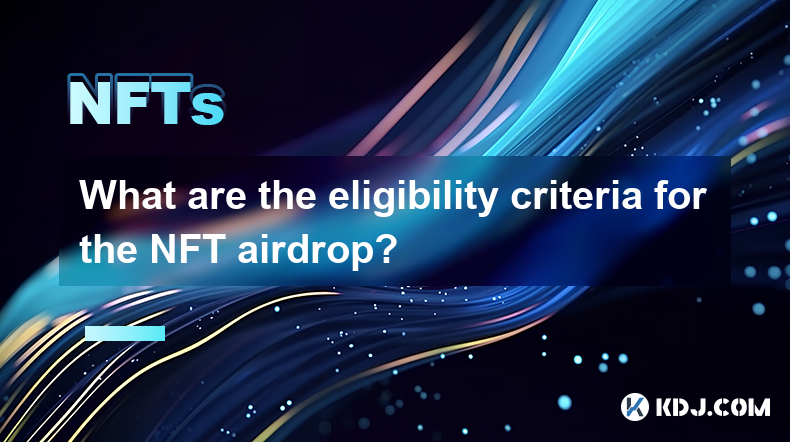
What are the eligibility criteria for the NFT airdrop?
Apr 17,2025 at 04:56pm
Understanding NFT AirdropsNFT airdrops are a popular method used by blockchain projects to distribute non-fungible tokens (NFTs) to their community members. These airdrops can serve various purposes, such as rewarding loyal users, promoting new projects, or increasing the visibility of existing ones. To participate in an NFT airdrop, individuals must me...

How to combine traditional artworks with NFTs?
Apr 17,2025 at 12:35am
The integration of traditional artworks with Non-Fungible Tokens (NFTs) represents a fascinating intersection of art and technology, offering artists and collectors new ways to engage with and monetize art. This article will explore how traditional artworks can be combined with NFTs, providing a detailed guide on the process, benefits, and consideration...
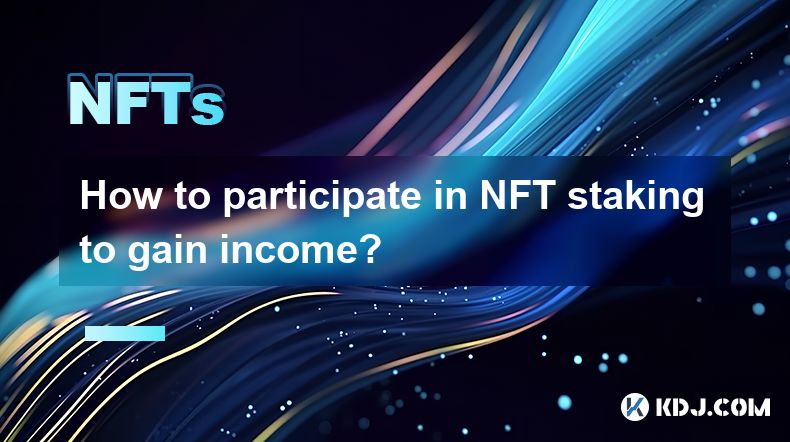
How to participate in NFT staking to gain income?
Apr 17,2025 at 06:14pm
Participating in NFT staking to generate income has become an increasingly popular method within the cryptocurrency community. NFT staking involves locking up your Non-Fungible Tokens in a smart contract to earn rewards, typically in the form of additional tokens or other benefits. This guide will walk you through the process of participating in NFT sta...
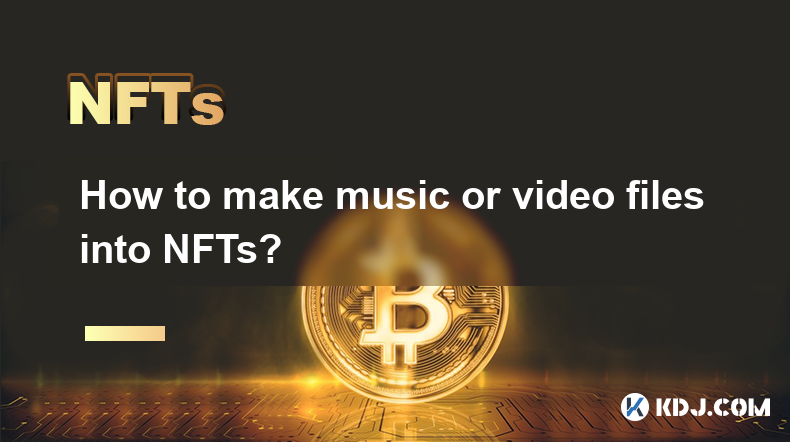
How to make music or video files into NFTs?
Apr 16,2025 at 10:29pm
Creating music or video files into Non-Fungible Tokens (NFTs) has become an increasingly popular way for artists and creators to monetize their work directly. This process involves converting your digital content into a unique token on a blockchain, which can then be bought, sold, or traded. Here’s a detailed guide on how to transform your music or vide...
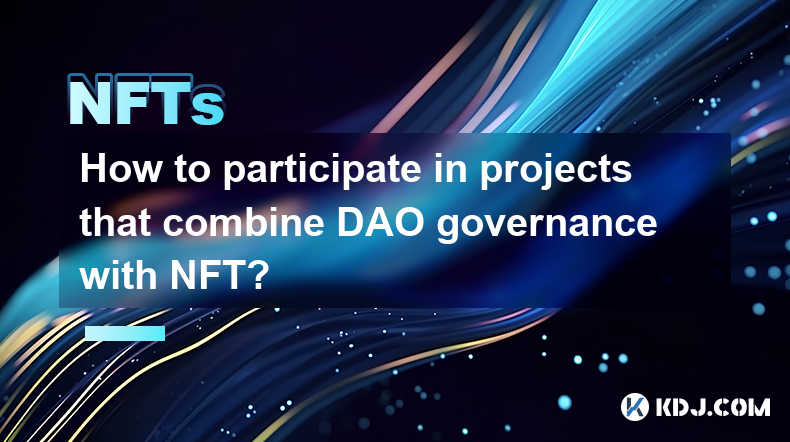
How to participate in projects that combine DAO governance with NFT?
Apr 17,2025 at 10:14am
Participating in projects that combine DAO governance with NFTs offers a unique opportunity to engage with decentralized communities and digital assets. These projects often involve voting on project decisions and owning unique digital tokens that can represent membership, access, or other benefits. Here's a detailed guide on how to participate in such ...
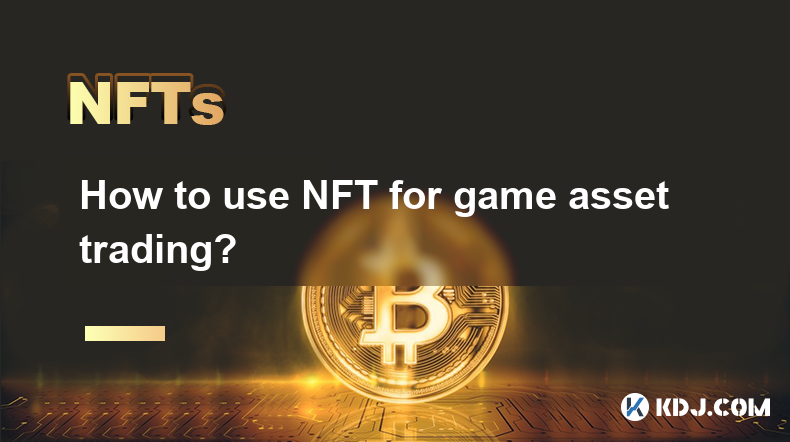
How to use NFT for game asset trading?
Apr 17,2025 at 12:21pm
Using Non-Fungible Tokens (NFTs) for game asset trading has become an increasingly popular method for gamers and developers alike to buy, sell, and trade unique in-game items. NFTs provide a way to prove ownership and authenticity of digital assets, making them perfect for trading game items that have unique characteristics and value. In this article, w...

What are the eligibility criteria for the NFT airdrop?
Apr 17,2025 at 04:56pm
Understanding NFT AirdropsNFT airdrops are a popular method used by blockchain projects to distribute non-fungible tokens (NFTs) to their community members. These airdrops can serve various purposes, such as rewarding loyal users, promoting new projects, or increasing the visibility of existing ones. To participate in an NFT airdrop, individuals must me...

How to combine traditional artworks with NFTs?
Apr 17,2025 at 12:35am
The integration of traditional artworks with Non-Fungible Tokens (NFTs) represents a fascinating intersection of art and technology, offering artists and collectors new ways to engage with and monetize art. This article will explore how traditional artworks can be combined with NFTs, providing a detailed guide on the process, benefits, and consideration...

How to participate in NFT staking to gain income?
Apr 17,2025 at 06:14pm
Participating in NFT staking to generate income has become an increasingly popular method within the cryptocurrency community. NFT staking involves locking up your Non-Fungible Tokens in a smart contract to earn rewards, typically in the form of additional tokens or other benefits. This guide will walk you through the process of participating in NFT sta...

How to make music or video files into NFTs?
Apr 16,2025 at 10:29pm
Creating music or video files into Non-Fungible Tokens (NFTs) has become an increasingly popular way for artists and creators to monetize their work directly. This process involves converting your digital content into a unique token on a blockchain, which can then be bought, sold, or traded. Here’s a detailed guide on how to transform your music or vide...

How to participate in projects that combine DAO governance with NFT?
Apr 17,2025 at 10:14am
Participating in projects that combine DAO governance with NFTs offers a unique opportunity to engage with decentralized communities and digital assets. These projects often involve voting on project decisions and owning unique digital tokens that can represent membership, access, or other benefits. Here's a detailed guide on how to participate in such ...

How to use NFT for game asset trading?
Apr 17,2025 at 12:21pm
Using Non-Fungible Tokens (NFTs) for game asset trading has become an increasingly popular method for gamers and developers alike to buy, sell, and trade unique in-game items. NFTs provide a way to prove ownership and authenticity of digital assets, making them perfect for trading game items that have unique characteristics and value. In this article, w...
See all articles























































































